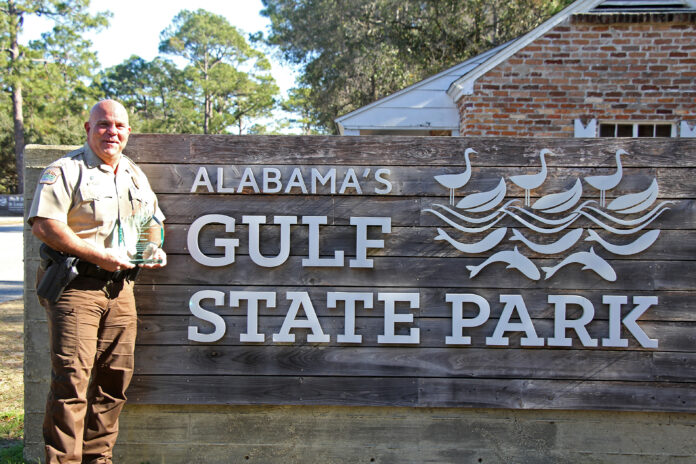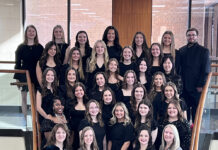
MONTGOMERY, Ala. – District Park Ranger Pete Mitchum, with the Alabama Department of Conservation and Natural Resources’ State Parks Division, was told to wear his Class A uniform to work recently, and he didn’t know why. He complied and found out that Alabama Conservation Enforcement Officers Association (ACEOA) President Vance Wood was on his way to meet him.
Wood, a Conservation Enforcement Lieutenant with the Department’s Wildlife and Freshwater Fisheries (WFF) Division, showed up at Gulf State Park to present Mitchum with the ACEOA Enforcement Officer of the Year Award.
“That was kind of a surprise,” Mitchum said. “While we are not conservation officers, we are officers who work for the Conservation Department. The ACEOA covers the enforcement personnel in all four divisions – State Parks, Wildlife and Freshwater Fisheries, Marine Resources and State Lands.
“It was an honor to receive it. There are about 200 enforcement officers in the Conservation Department, and there is probably somebody out there that deserved it more than me, but I am grateful for the award.”
Director Greg Lein said Alabama State Parks is proud to have Mitchum considered for the ACEOA award.
“We think he’s a great recipient of the award,” Lein said. “I think the thing we’re most pleased with is the fact that he was nominated by his own people, which says a lot about the kind of leader he is. They respect him and respect his leadership to a degree that they wanted to nominate him. We’re proud to have him as a part of our team.”
Mitchum’s law enforcement career began in 1994 with a sheriff’s department in South Carolina, his wife’s home state. He worked patrol, K-9 and narcotics before being hired by the U.S. State Department in 2006 as a police advisor to advise and mentor the Afghanistan National Police.
“The whole concept was to teach an Islamic police force democratic policing,” said Mitchum, who said he’d always wanted to be in law enforcement since Mobile Police Officer Dan Buck gave him a short ride in a squad car when he was 7 years old. “It sounds challenging, and it was. I think we did a lot of good over there. I made a lot of longtime friends.”
After eight months at home, a friend called and asked him about being a bomb-detection dog handler back in Afghanistan. Mitchum only had experience with dual-purpose police dogs, not bomb dogs. After some convincing, he headed back overseas.
“Got my dog, and we were searching cars and buildings,” he said. “I had a really awesome dog (a Belgian Malinois named Brutus). He was a sharp, sharp dog. He received several recognitions while we were over there. It was all the dog. I was just holding the leash.
“The camp (near Kabul) got hit in 2015, and he developed a little PTSD (post-traumatic stress disorder). Loud noises made him shut down. They retired him, and the general at that time was kind enough to fly him back to the states to be with me. That was pretty awesome.”
About six months later, he got a call about job openings as a WFF Conservation Enforcement Officer.
“I had always wanted to do this, but the stars never lined up,” Mitchum said. “Fast forward, I get hired as a game warden.”
Mitchum went to Perry County to start his WFF career, then moved to Escambia County before ending up in Mobile County.
The District Park Ranger’s position with Alabama State Parks was being developed, and Mitchum was intrigued by that possibility because of his appreciation for the State Parks System. Although the COVID pandemic delayed the process, he was hired to that position to cover the Southwest District, which includes Gulf State Park and Meaher State Park at the head of Mobile Bay.
“Meaher is easy,” he said. “We have a great staff up there. The Gulf State Park is a big park with more than 28 miles of trails, six beach accesses, the Gulf State Park Pier and the campground. That can keep any man busy.”
Mitchum oversees two park rangers and six security personnel with another park ranger scheduled to join the staff on February 1.
“First and foremost, we’re ambassadors for the park,” he said. “Our park users see us all over the place. I initially had a misconception of what we actually did. I’m thinking it was mainly guest relations, which is a big portion of it, and riding the trails and beaches. But it’s so much more. We have to consider the hospitality/tourism side of it because we are in the hospitality/tourism business. That’s our bread and butter. But we’re also law enforcement and deal with break-ins, burglaries, narcotics and other drugs, DUIs and traffic problems. And we have hurricanes, like Hurricane Sally that hit the first year I was here.
“We put on so many hats. At times, we may have to put on a maintenance hat. We may be out cutting trees and clearing trails after a hurricane. We may be helping put up road signs or a fence. It’s not the norm. We have to be very versatile, very fluid in our day-to-day activities. But that’s what makes this job so great. You get to do it all. I ended up where I was meant to be. I love it down here. I’m truly blessed to be here.”
Mitchum said visitors come from all over the world to experience what Gulf State Park has to offer.
“You can hit close to 30 miles of trails and see bobcats, turtles and deer,” he said. “Then you can drive a half-mile and walk onto sugar-sand beaches and see all the marine life. Then you can go out on the pier and catch a wide variety of fish. There’s no other place like it.”
Mitchum’s District Park Ranger position hasn’t been the only change to the Parks’ State Personnel register for enforcement, according to Lein.
“The most important is the Park Ranger entry level position,” Lein said. “That is now open for continuous recruitment, and it’s been rewritten to clarify the approach we take to law enforcement now. We are always looking for good officers and would love to add to our Park Ranger staff around the state.
“As Commissioner (Chris) Blankenship was saying the other day, the park ranger job may have the most complicated law enforcement responsibilities in the Department,” Lein said. “They do such a diverse array of work, and they’re doing it in a hospitality setting. They’re almost like policemen in a city, managing for those normal enforcement duties, like speeding, DUIs, domestic disputes. Then we have the regulations about the conduct of guests in park. Then we have the natural resources, making sure they’re not being abused. That’s a lot.
“They have to be really tactful. They have to educate our guests on why the speed limit is important, that there are cyclists on the road and wildlife in the park. The same goes for going into the campground to enforce quiet hour. We don’t want to alienate our customers who we depend on to make our State Parks great, but we won’t tolerate behavior that detracts from the enjoyment of our beautiful parks by our other guests.”
Visit www.alapark.com/law-enforcement-career-opportunities for more information.


















